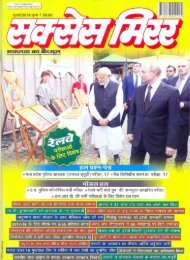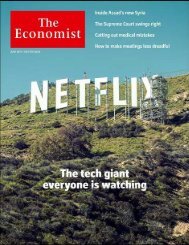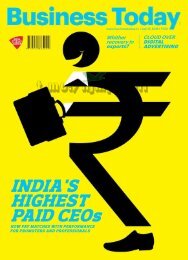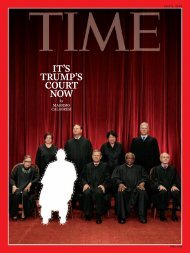Fortune
Create successful ePaper yourself
Turn your PDF publications into a flip-book with our unique Google optimized e-Paper software.
MA VS. MA<br />
make a product that’s addictive, that is not<br />
terribly healthy for kids. How’s that diferent<br />
from a cigarette company?” (Tencent’s reach in<br />
gaming is global: Tsai notes that his son has become<br />
an avid fan of the virally popular “battle<br />
royale” game Fortnite, published by North<br />
Carolina’s Epic Games, in which Tencent holds<br />
a 40% stake.) Tsai surmises that Tencent’s pivot<br />
to retailing is connected. “They probably came<br />
to an existential realization and said, ‘Wait a<br />
minute, we’re in the wrong business.’”<br />
Tsai may be misinterpreting Tencent’s motives,<br />
but regardless, he thinks Alibaba holds<br />
the stronger hand. “Tencent has woken up<br />
and decided that they also want to become<br />
somebody in e-commerce,” he says. “But we’ve<br />
been doing this for the last 19 years…It’s not<br />
just about developing an app or a product for<br />
users. It’s about creating an ecosystem and also<br />
the supply chains for the merchants.”<br />
Ecosystem is the operative word, and both<br />
companies can have sharp elbows when<br />
protecting their platforms. Each has invested<br />
aggressively in newfangled app-driven services<br />
like bike sharing and ride hailing, the better<br />
to lock in users to their ecosystems—and their<br />
respective payment services, key features, in a<br />
country where consumers are more than happy<br />
to forgo cash when they shop. (If you want to<br />
use Alibaba platform partner Ofo, for example,<br />
it is relatively inconvenient to pay with<br />
Tencent’s WeChat Pay; using Alipay is a hassle<br />
when renting with Mobike, the bike-share<br />
contestant in Tencent’s camp.) The two have<br />
efectively created “walled-garden” versions of<br />
the Internet, argues Tom Birtwhistle, a consultant<br />
with PwC in Hong Kong who has studied<br />
both companies extensively. “Consumers are<br />
blocked from traversing the two Internets.” You<br />
can’t move easily, for instance, from WeChat to<br />
Taobao. That’s a far less genteel approach than<br />
Silicon Valley’s titans take with one another:<br />
Apple hosts apps from Facebook and Google,<br />
for example. Those Western companies, argues<br />
Birtwhistle, may be “frenemies, but they’ve assembled<br />
together to form an integrated online<br />
experience.” Not so Tencent and Alibaba.<br />
On rare occasions, the two invest together, as<br />
they did in 2013 by starting an online insurance<br />
company, called ZhongAn, with insurer<br />
Ping An (whose CEO also is named Ma). Indeed,<br />
if history repeats, it’s possible that many<br />
of the companies’ jabs and feints at each other’s<br />
properties will amount to just that. “Internally,<br />
Tencent people hold Alibaba in high regard,”<br />
says one former Tencent insider. “They all buy<br />
on Taobao.” What’s more, Tencent would have<br />
to invest heavily and in a new way to match the<br />
physical logistics prowess of Alibaba and its<br />
Cainiao ailiate. “WeChat is positioned to be an<br />
important entry point, but no more,” says the<br />
insider. At the same time, as it focuses on business<br />
applications like DingTalk, Alibaba understands<br />
it can’t challenge WeChat’s dominance<br />
in consumer messaging. Acknowledges Daniel<br />
Zhang, Alibaba’s CEO: “Even I use WeChat.”<br />
T<br />
THE AREA WHERE the Tencent-Alibaba battle is<br />
most obvious is in their respective investment<br />
strategies. The two have been such assiduous<br />
dealmakers that the astute Hong Kong–<br />
based Bernstein analyst Bhavtosh Vajpayee<br />
counted 280 Tencent deals over the past three<br />
years and 174 for Alibaba. “Who can possibly<br />
fathom everything Alibaba and Tencent have<br />
invested in already?” Vajpayee writes in a report<br />
to clients. Branding the deal-crazy companies<br />
“shopaholics,” he wonders if they “have<br />
a record of their doings, [as] investments and<br />
stakes can get lost in the crevices somewhere,<br />
given the sheer numbers involved.”<br />
The two have clearly divergent styles. Alibaba<br />
tends to take large or controlling stakes,<br />
reflecting what Joe Tsai calls the company’s<br />
“operating mindset.” That’s been the case<br />
in Southeast Asia, where it took control of<br />
e-commerce site Lazada and installed Lucy<br />
Peng, an Alibaba cofounder and longtime<br />
executive, as CEO. Tencent, in contrast, favors<br />
multiple small stakes, such as its 5% share of<br />
U.S. gaming giant Activision Blizzard. And<br />
when it does take control, it typically leaves<br />
management in place. At Riot Games in Los<br />
Angeles, for example, Tencent invested alongside<br />
the company’s venture capitalists when it<br />
licensed Riot’s popular League of Legends title.<br />
Later it bought the company outright—but<br />
didn’t mess with how it’s run. “They were selfaware<br />
that it would destroy a lot of value if we<br />
had reported to some SVP of such and such,”<br />
says Marc Merrill, Riot’s cofounder.<br />
Being hands-of doesn’t mean Tencent<br />
always plays nice. Imitation is ingrained in<br />
its culture, and Tencent doesn’t shy away<br />
“internally,<br />
tencent<br />
peoplehold<br />
alibabain<br />
highregard,”<br />
saysone<br />
former<br />
insider.<br />
meanwhile,<br />
www.t.me/velarch_official<br />
alibaba’s<br />
CEOadmits,<br />
“eveniuse<br />
[Tencent’s]<br />
wechat.”<br />
82<br />
FORTUNE.COM // JULY.1.18
















